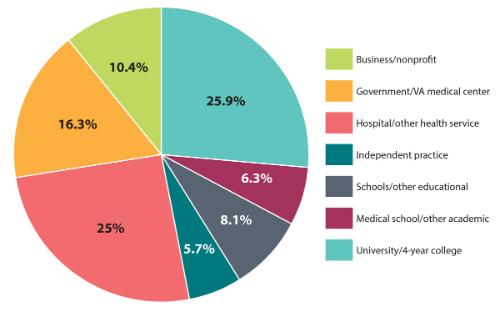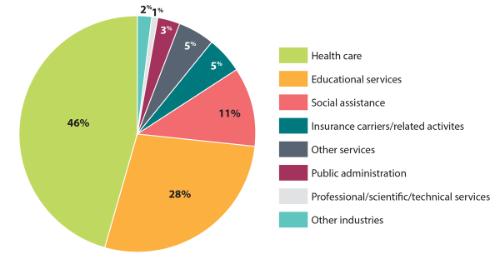Behavioral science is the study of human behavior. It is a systematic critical investigation of the interactions among people and their environment in order to understand, predict and change behavior for personal wellness, social improvement and organizational effectiveness.
The field is diverse, offering a broad range of career paths, with many specializations in the areas of psychology and applied behavior analysis. This diversity gives graduates the advantage of developing a career in any number of industries including education, social service agencies, medical organizations, residential facilities, counseling firms and private practice.
As society and employers expand their interest in gaining deeper insight into human behavior, niche specialty areas continue to develop offering long-term career opportunity.
Behavior Science Degree and Career Options
The career options in behavioral science demand an interest in the human condition, as well as the understanding and analysis of data. Degrees in behavioral science typically encompass the science of psychology, performance management and education. Using observation, interpretation, research and communication, behavioral scientists work to further understand human behavior and to modify social and individual behavioral problems.
Those in the behavioral sciences often choose to become psychological therapists, behavior analysts and social workers. However, graduates in the field are discovering a high demand for their skills in business, social and public policy, criminal justice and social networks, to name a few. Because of this, individuals must consider what level of education they should pursue, and what accreditation is applicable for their desired career path.

 Give to Florida Tech
Give to Florida Tech 
 Accreditation indicates that an educational program has met quality standards outlined by an accrediting agency, which assesses that schools are meeting the standards. Accreditation can be awarded to an institution and/or to a program. Beyond degree education, board certification is available for many fields in psychology and behavior analysis, which demonstrates competency in specialty areas and a commitment to the field. To learn more about accreditation and board certification, consult the websites below.
Accreditation indicates that an educational program has met quality standards outlined by an accrediting agency, which assesses that schools are meeting the standards. Accreditation can be awarded to an institution and/or to a program. Beyond degree education, board certification is available for many fields in psychology and behavior analysis, which demonstrates competency in specialty areas and a commitment to the field. To learn more about accreditation and board certification, consult the websites below.



 According to the Department of Health and Human Services, 13 percent of the population was over 65 years of age in 2010, with 10 percent of this population diagnosed with dementia. By 2050, 20 percent of the population will have reached 65 years of age. While the average lifespan has continued to increase, the attention to physical and mental issues associated with advanced age has not kept pace. In fact, the National Institute of Aging estimates that 5,000 full-time, doctoral-level geropsychologists will be needed by 2020 to accomodate the increasing demands of aging baby boomers.
According to the Department of Health and Human Services, 13 percent of the population was over 65 years of age in 2010, with 10 percent of this population diagnosed with dementia. By 2050, 20 percent of the population will have reached 65 years of age. While the average lifespan has continued to increase, the attention to physical and mental issues associated with advanced age has not kept pace. In fact, the National Institute of Aging estimates that 5,000 full-time, doctoral-level geropsychologists will be needed by 2020 to accomodate the increasing demands of aging baby boomers. Organizational behavior management is a subfield of applied behavior analysis that uses behaviorism to influence specific behaviors in the workplace, such as safety behaviors. Unlike industrial organizational psychology, that uses psychological theories and principles to increase workplace culture and productivity, behavior analysts approach the workplace with an eye toward very explicit goals, using prediction and control of behaviors to make change.
Organizational behavior management is a subfield of applied behavior analysis that uses behaviorism to influence specific behaviors in the workplace, such as safety behaviors. Unlike industrial organizational psychology, that uses psychological theories and principles to increase workplace culture and productivity, behavior analysts approach the workplace with an eye toward very explicit goals, using prediction and control of behaviors to make change. Both psychologists and applied behavior analysts work with autistic individuals. However, as behavior analysis has expanded and been applied in different treatment areas, it has become widely recognized as a safe and effective treatment for autism, helping persons with the disorder enjoy a better quality of life, develop basic personal skills and succeed in an educational environment.
Both psychologists and applied behavior analysts work with autistic individuals. However, as behavior analysis has expanded and been applied in different treatment areas, it has become widely recognized as a safe and effective treatment for autism, helping persons with the disorder enjoy a better quality of life, develop basic personal skills and succeed in an educational environment. Facilities like The Scott Center for Autism Treatment at Florida Tech in Melbourne, Florida, place an emphasis on research and training of its clinical personnel to provide the most advanced diagnosis and treatment programs for those individuals living with autism spectrum disorder. This affords graduate students with state-of-the-art training and supervision from doctoral-level faculty and the first professional experience as a psychologist or applied behavior analyst.
Facilities like The Scott Center for Autism Treatment at Florida Tech in Melbourne, Florida, place an emphasis on research and training of its clinical personnel to provide the most advanced diagnosis and treatment programs for those individuals living with autism spectrum disorder. This affords graduate students with state-of-the-art training and supervision from doctoral-level faculty and the first professional experience as a psychologist or applied behavior analyst.